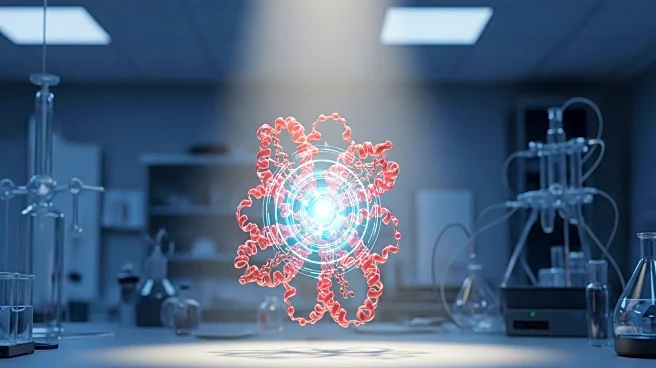What's Happening?
Researchers at the University of Washington have made significant advancements in targeted drug delivery by designing proteins with autonomous decision-making capabilities. In a study published in Nature Chemical Biology, the team demonstrated that by adding smart tail structures to therapeutic proteins, they could control the proteins' localization based on specific environmental cues. These protein tails fold into preprogrammed shapes, allowing them to react to different combinations of cues. This innovation enables the proteins to be attached to carrier materials for delivery to living cells, potentially revolutionizing how therapies are targeted within the body. The research builds on previous work from 2018, where materials were created to respond to multiple biomarkers using Boolean logic, a concept from computer programming.
Why It's Important?
The development of programmable proteins for targeted drug delivery holds significant implications for the medical field, particularly in the treatment of diseases like cancer. By enabling therapies to precisely target affected areas, this technology can reduce dosage requirements and minimize harmful side effects. The ability to manufacture these proteins quickly and at scale represents a major advancement, potentially leading to more sophisticated and scalable disease-targeting therapies. This innovation could transform how treatments are developed and administered, offering more personalized and effective healthcare solutions.
What's Next?
The research team plans to continue exploring additional biomarkers that proteins could target, aiming to refine and expand the capabilities of their technology. Collaborations with other laboratories are anticipated to further develop and deploy real-world therapies. The researchers envision applications beyond cancer treatments, including diagnostic tools and therapies manufactured within individual cells. As the technology advances, the potential for creating larger logical circuits responsive to multiple biomarkers could lead to even more precise targeting within the body.
Beyond the Headlines
The ethical and cultural implications of programmable proteins in medicine are profound. This technology could redefine patient care, offering more tailored treatments and potentially reducing healthcare costs. However, it also raises questions about accessibility and the equitable distribution of advanced therapies. As the technology progresses, considerations around regulatory approval and ethical use will become increasingly important.








